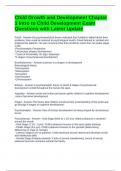-
1. Exam (elaborations) - Assessment quiz - child growth and development exam questions and answers
-
2. Exam (elaborations) - (cgdr) child growth and development exam questions with latest update
-
3. Exam (elaborations) - Cgdr- child growth and development exam questions with latest update
-
4. Exam (elaborations) - Chapter 4 - middle childhood growth and development exam questions with latest update...
-
5. Exam (elaborations) - Chapter 6 "growth and development of the child" exam questions with correct answers
-
6. Exam (elaborations) - Chapter 10 & 11 child growth and development exam questions and answers
-
7. Exam (elaborations) - Chapter 28 growth and development of the school-age child exam questions with correct...
-
8. Exam (elaborations) - Child care professional 1 - lesson 2 child growth and development, part 1 exam questi...
-
9. Exam (elaborations) - Child growth & development- chapter 12 and 13 exam questions and answers
-
10. Exam (elaborations) - Child growth & development exam questions with complete solutions
-
11. Exam (elaborations) - Child growth and development (cgad) exam questions with correct answers
-
12. Exam (elaborations) - Child growth and development (cgdr) exam questions with verified answers
-
13. Exam (elaborations) - Child growth and development cgdr dcf exam questions and answers
-
14. Exam (elaborations) - Child growth and development ch. 1-4 exam questions with correct answers
-
15. Exam (elaborations) - Child growth and development chapter 1 exam study guide questions and answers
-
16. Exam (elaborations) - Child growth and development chapter 1 intro to child development exam questions with...
-
17. Exam (elaborations) - Child growth and development- chapter 2 exam questions and answers
-
18. Exam (elaborations) - Child growth and development chapter 5 exam questions and answers
-
19. Exam (elaborations) - Child growth and development chapter 7 exam questions with latest update
-
20. Exam (elaborations) - Child growth and development chapter 9 study guide exam questions and answers
-
21. Exam (elaborations) - Child growth and development chapter exam questions and answers
-
22. Exam (elaborations) - Child growth and development exam 2 study guide questions and answers
-
23. Exam (elaborations) - Child growth and development exam questions and answers latest update
-
24. Exam (elaborations) - Child growth and development exam questions and answers
-
25. Exam (elaborations) - Child growth and development exam questions and answers
-
26. Exam (elaborations) - Child growth and development exam questions with correct answers
-
27. Exam (elaborations) - Child growth and development exam questions with latest update
-
28. Exam (elaborations) - Child growth and development exam study guide questions and answers
-
29. Exam (elaborations) - Child growth and development final exam questions with correct answers
-
30. Exam (elaborations) - Child growth and development midterm exam questions and answers
-
31. Exam (elaborations) - Child growth and development midterm exam questions with latest update
-
32. Exam (elaborations) - Child growth and development module 1 exam test guide questions and answers
-
33. Exam (elaborations) - Child growth and development module 1 the principles of child growth and development ...
-
34. Exam (elaborations) - Child growth and development module 2-child development theories exam questions with ...
-
35. Exam (elaborations) - Child growth and development module 3 influences affecting child growth and developme...
-
36. Exam (elaborations) - Child growth and development module 4 developmental characteristics exam questions an...
-
37. Exam (elaborations) - Child growth and development module 5 developmental characteristics exam questions wi...
-
38. Exam (elaborations) - Child growth and development module 6 developmentally appropriate practices exam ques...
-
39. Exam (elaborations) - Child growth and development test #1 exam questions with correct answers
-
40. Exam (elaborations) - Unit 1 - child growth and development exam questions with complete solutions
-
41. Exam (elaborations) - Understanding child growth and development exam questions with verified answers
-
42. Exam (elaborations) - Principles of child growth & development exam questions and answers
-
43. Exam (elaborations) - Module 1 princples of growth and development exam questions with latest update
-
44. Exam (elaborations) - Module 1 principles of child growth and development exam questions and answers
-
45. Exam (elaborations) - Module 1 - 6 child growth and development exam questions with correct answers
-
46. Exam (elaborations) - Maternal child growth & development exam questions with correct answers
-
47. Exam (elaborations) - Growth and development questions, answers, rationales exam questions with complete so...
-
48. Exam (elaborations) - Growth and development exam questions with correct answers
-
49. Exam (elaborations) - Eec child growth and development exam questions and answers
-
50. Exam (elaborations) - Child growth and development theories exam questions and answers
-
51. Exam (elaborations) - Child growth and development theories exam questions and answers
-
52. Exam (elaborations) - Child growth and development vocabulary exam questions and answers
-
53. Exam (elaborations) - Dcf - child growth and development exam questions and answers 2024
-
54. Exam (elaborations) - Dcf child growth & development exam questions with correct answers
-
55. Exam (elaborations) - Dcf child growth and development cgad exam questions with verified answers
-
56. Exam (elaborations) - Dcf fl child care (cgdr) child growth and development (2024) exam questions with corr...
-
57. Exam (elaborations) - Early childhood growth and development exam questions with latest answers
-
Show more




